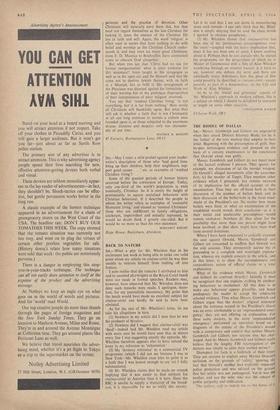BACK TO NATURE
SIR,—What a pity for Mr. Wheldon that in his excitement last week at being able to make one valid point about my article on cinema-verite he was then unable to restrain himself from rushing off into fantasy.
I now realise that the remarks I attributed to him and to assorted playwrights at the Royal Court lunch were not made in formal speeches. Readers may, however, have observed that Mr. Wheldon does not deny such remarks were made. I apologise, there- fore, for my journalistic inaccuracy. My point that the lunch would have made an excellent subject for cinema-verite can hardly be said to have been obviated.
As for the rest of Mr. Wheldon's letter, let me take his allegations in turn.
(1) Nowhere in my article did I state that he was the producer of Monitor.
(2) Nowhere did I suggest that cinema-verite was `dead'—indeed had Mr. Wheldon read my article with more care he would have seen that in almost every line I was suggesting exactly the opposite. Mr. Wheldon therefore appears also to have missed the irony in my reference to 'exhumation.'
(3) My 'derisory reference' to a commercial TV programme (which I did not see because I was in New York—Mr. Wheldon even tries to paint it as a fault that I was honest enough to say so) I fully substantiated.
(4) Mr. Wheldon claims that he made no remark implying that it was easier to find subjects for cinema-verne in America than it is here. Since the BBC is unable to supply a transcript of the broad- cast, it is impossible for me to verify this exactly,
Let it be said that I am not alone in remembering some such remark—I can only think that Mr. Whel- don is simply denying that he used the exact words I 'quoted' in obvious paraphrase.
(5) Mr. Wheldon claims that cinema-yerite has been one of his 'professional preoccupations over the years'—coupled with the heavy implication that, since it has not been one of mine, I know nothing about it. Perhaps then he can explain why he started his programme (or the programme of which he is Master of Ceremonies) with a film of Alan Whicker wandering through an oriental bazaar; it is hard to see, however one defines the term and there are admittedly many definitions, how this piece of film could possibly be described as cinema-verite—except possibly as part of a documentary on the Life and Work of Alan Whicker.
(6) As to the 'trivial and gimmicky' aspects of Mr. Wheldon's approach to modern culture, this is a subject on which I should he delighted to expound at length on some other occasion.
8 Cheyne Walk, SW3
coals" ()mut nookiat


































 Previous page
Previous page